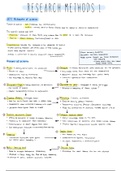Samenvatting
Summary Research Methods / Methodology 1 - Year 1, Period 1 - English
This pdf is a visual and concise summary of the Research Methods / Methodology 1 course at the Vrije Universiteit van Amsterdam (VU) for the English psychology track (But may also be helpful for Dutch students). Includes information from the book and the lectures (note: not of the extra online syll...
[Meer zien]





